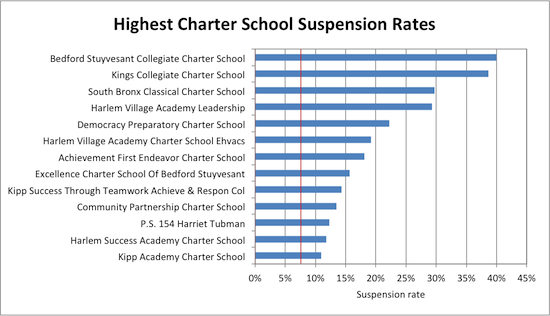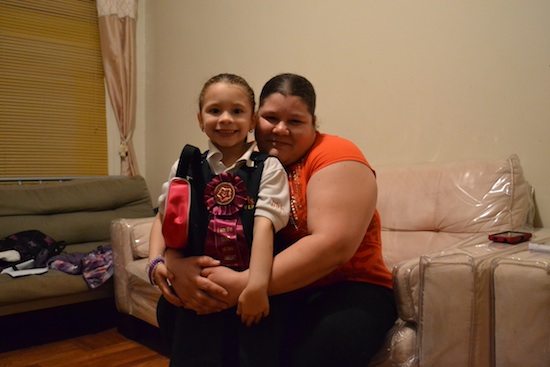Pushed Out: Charter Schools Contribute to the City’s Growing Suspension Rates

A recent report by the New York Civil Liberties Union exposed the escalating number of students who have been suspended since Mayor Michael Bloomberg took control of the city’s schools more than a decade ago. Some believe one contributing factor may lie in the growing number of the public charter schools created during his tenure that develop their own discipline codes and have higher than average suspension rates.
Advocates for Children, a nonprofit that represents the legal rights of public school children, believe that the rise in charters (77 in 2008 and 135 in 2012) has gone hand in hand with the fact that a number of them exclude children–particularly those with special needs–at higher than average rates.
“One thing that’s great about charters is that they have access to resources others may not have, and said Paulina Davis, an attorney with Advocates for Children, who works specifically on the organization’s Charter School Initiative. “We want them to use them for benefit, not for exclusion.”
Some, not all, of the more well-established charter networks known for their “No Excuses” curriculum suspend kids at some of the highest rates in the city. Two Brooklyn Collegiate Charter Schools in the UnCommon Schools network suspend students at 35 and 40 percent rates. Achievement First, another charter network with strict behavior codes suspends 4 to 18 percent of its students at its five city schools, higher than the city’s average.
Democracy Preparatory Charter High School in Harlem suspended 22 percent of its students. Its other four locations did not list suspension data. Others ranged from lower to higher-than-average suspension rates. The Harlem Success Academy suspended 5 to 12 percent of its students at its four locations. The city’s four Knowledge is Power Program charters, which are part of a national network of “no excuses” schools, suspended between 6 and 14 percent of its students. For the 2008-09 data, the average suspension rate for the city’s 77 charter schools at the time was 7.6 percent. All numbers are based on the 2008-09 school year, the most recent data available.
Dixon Deutsch, director of the Special Education Collaborative at the New York Charter School Center said there are two sides to the charter suspensions debate, and that schools that use the “no excuses” model believe in trying to ensure a productive and safe environment for all students, Deutsch said.
“I think it’s important to have a discipline policy that is rigorous and also fair,” said Deutsch. “My particular plan is to believe in high expectations for kids, but also sweat the small stuff, because small stuff builds up over time and becomes very large stuff very quickly.”
Many public charters do provide better than average environments for special needs children, Deutsch said. But it’s tricky to create a productive environment for all children that does not compromise the rights of students with behavioral and learning needs. Some teachers feel the pressure to clear behavior problems from their classrooms in order to boost test scores. Others simply are unaware of the proper procedures for handling behavior and learning issues.
As of 2012, about 125 of the city’s current 135 charters belong to the Special Education Collaborative that just recently began providing behavioral specialists to charter schools, Deutsch said.
Brianna Pena, 5, was suspended from her "No Excuses" charter on her very first day in school. (Photo by Sarah Tan)
One kindergarten girl, Brianna Pena, 5, was recently pushed out of her strict disciplinary school, the Harriet Tubman Charter in the Bronx, after throwing a tantrum on her first day of school. Brianna’s mother, Milagros Lopez, had transferred her from another similar charter, South Bronx Classical, in October, after she felt the rules and standards for behavior were too strict. The experience was no different at the Harriet Tubman Charter, however, where Brianna spent less than a day there before the school suspended her and demanded she be psychologically evaluated before she be able to return.
“Her first day of school at Tubman, they didn’t even let her stay, she wasn’t even there for an hour,” Lopez said.
The school reported Brianna had been “yelling and throwing chairs,” a school document of the incident stated. Video footage taken by a teacher shows a small girl crying on the floor of a classroom.
“If there was an issue, they should have called me into the office,” Lopez said. “Obviously, she was just having adjustment issues, it was her first day there.”
Lopez has since placed Brianna at Girls Prep, an all-girls charter in the Bronx, where she said that though Brianna has had minor behavior and adjustment issues, the school has made an effort to work with her and Pushed Out: Charter Schools Contribute to the City’s Growing Suspension Rates | School Stories:
Charter schools suspend kids, public schools don’t — which does better? | New York Post http://bit.ly/1L7O0jY



